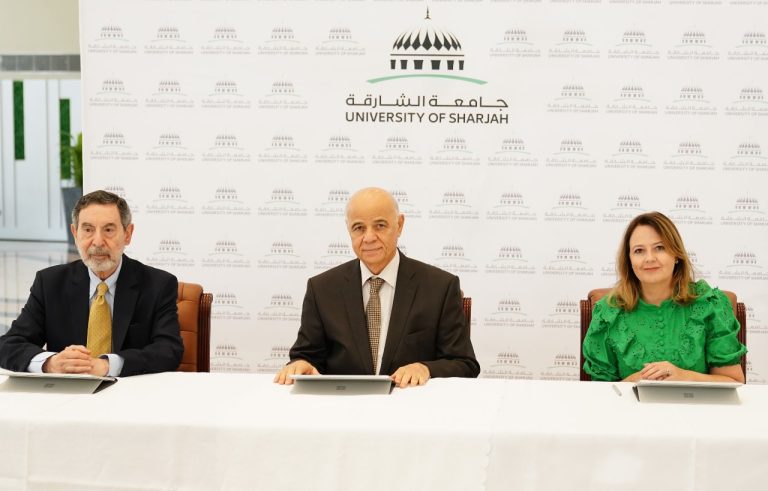Sharjah – The universities of São Paulo (USP) and Sharjah (UoS) signed on Wednesday (7) an academic memorandum of understanding that will entail exchange of knowledge and research, as well as the exchange of professors, students and researchers in fields of sustainability. The agreement signed in the headquarters of the UoS featured the Arab-Brazilian Chamber of Commerce (ABCC), which will facilitate the operations between the universities.
In addition so the MoU signing, the UoS held the event “Strategic Dialogue for Climate Change,” a result from joint efforts by USP and UoS and supported by the ABCC and the Order of Attorneys of São Paulo.
Prof. Abdelaziz Soufyane, director of the Office of International Relations of the UoS, said the agreement is very important for facilitating research on topics regarding climate change and energy transition, as well as for the professor and student exchange between the universities. According to him, the MoU will run for an initial period of five years, and the idea is to jointly hold mobility workshops and programs to facilitate the exchange between the universities for them to work together.
Prof. Patrícia Iglesias, Head of Environment of USP, spoke of the importance of the MoU signed. “We believe cooperation with the UoS is fundamental as we want to do a joint work to think about the COP30 in 2025, what we can do to contribute to them and vice versa. We believe we have here a strong region in energy that is really looking at new technologies, and despite it’s more of a fossil fuel, we want to bring it to the table of sustainability, too,” she said.
Iglesias said that USP has lots of research including in green hydrogen, and that there is synergy with the UoS. “The goal now is to put professors from each of these schools to talk and see how we could exchange researchers, students and professors from here to Brazil and from Brazil to here, to further advance these work in sustainability,” she said.
The initial run of the agreement is five years, but its first deliveries will be two years from now, ahead of COP30. “I believe it’s important to underscore the participation of the ABCC, because USP president [Carlos] Carlotti believes the university can’t focus solely on theory and we have to help solve problems of public policies, and the ABCC made this connection with the private sector and brought these inputs,” she said.
ABCC president Osmar Chohfi said when opening the event that global warming is a critical issue for our societies, particularly in developing countries. “The partnership signed today between these two renowned universities represents a joint effort to address this. Together these institutions can combine expertise and resources to develop research and practices to drive the development of nature-based solutions and contribute to the global debate on the implementation of the carbon market, he said.
The ambassador believes that international cooperation is key in tackling climate challenges. In addition to government action, convergence between the academy and the business sector plays a crucial role in transitioning to a decarbonized economy. He said, “The ABCC wants to play a role in facilitating dialogue and collaboration between universities and companies interested in adopting more sustainable practices.”

“Cooperation between academic institutions from different geographic regions and cultures enriches research and development, bringing diverse perspectives together. The exchange of experiences between UoS and USP could not only boost academic excellence but also contribute to the training of a generation of people capable of dealing with the complex challenges related to climate change,” he said.
According to Chohfi, besides the progress in identifying problems and the consequent actions to be taken, it is necessary to find viable economic solutions for decarbonization that encourage the implementation of nature conservation strategies and the mitigation of carbon emissions across the globe. “Special attention must be given to the situation of the most vulnerable countries or those least prepared to face these challenges,” he said.
It is expected that by 2025, when the COP30 will be held in Belém, Brazil, the parties can present and discuss the results of the partnership in terms of public policies, private initiatives, financing programs, and international cooperation.
Dialogues
The event in the UoS gathered 60 people, mostly from Brazil but also from the United Arab Emirates, from the public and private sector and the academy. The UoS was represented by Professor Maamar Bettayeb, Vice Chancellor for Research and Graduate Studies, Professor Abdallah Shanableh, director of the Department of Civil & Environmental Engineering, Professor Chaouki Ghenai, Chairman of the Research Funding Department, President Hamid Al Naimiy, and Professor Ali Ali El-Keblawy, of the Department of Applied Biology.
USP was represented by Rosa Ramos, chairwoman of the Environmental Council of the Order of Attorneys of São Paulo, President Carlos Gilberto Carlotti Jr., Professor Carlos Eduardo Pellegrino Cerri, coordinator of the Center for Carbon Research in Tropical Agriculture.
Topics discussed the best practices and public policy that can be implemented in Latin America and the Arab countries. This panel featured Enéas Xavier de Oliveira Jr., climate change researcher at LACLIM, Professor Fernanda Fernandez, environmental consultant at USP, David Canassa, executive director of Reservas Votorantim, Guilherme Piai Filizzola, secretary of agriculture of the state of São Paulo, and Dr. James Arruda, head of research on Honey and Bees at Fujairah Research Center.
Translated by Guilherme Miranda




